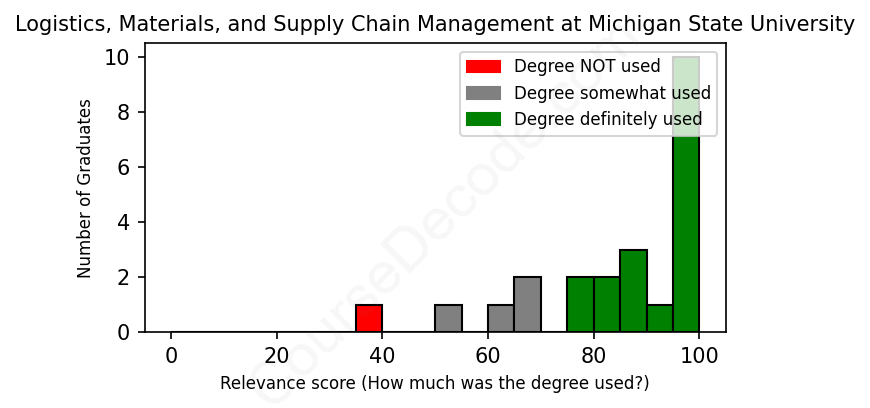
First, some facts. Of the Logistics, Materials, and Supply Chain Management graduates from Michigan State University we've analyzed , here's how many have used (or NOT used) their degree in their career:

These are estimates based on AI analysis of 23 LinkedIn profiles (see below).
The verdict? Significantly above average. Overall, with an average relevance score of 84%, Logistics, Materials, and Supply Chain Management graduates from Michigan State University have a much higher likelihood (+17%) of finding work in this field compared to the average graduate across all fields:
And for comparison, here's the chart for all profiles we've looked at across all degrees.
Also, after graduating, only 13% of these graduates have pursued further education other than another Bachelor's degree (such as a Masters degree or other), compared to the average across all profiles of 35%. This suggests a Bachelors degree is enough for most Logistics, Materials, and Supply Chain Management graduates, and it's normal to look for work straight after graduation.
See the details:
|
Relevance score: 54% We think this person has gone into a career only somewhat relevant to their degree. We think this person has gone into a career only somewhat relevant to their degree.
DEGREE INFOGraduated in 2016 from Michigan State University with a Bachelor of Arts - BA in Logistics, Materials, and Supply Chain Management. Also pursued further education since (see below). JOB HISTORY SINCE GRADUATIONCustomer Operations Specialist - Business Developmemt Coyote Logistics Jun 2016 - Aug 2019 Transportation & Logistics Data Analyst  Cargill Nov 2020 - Feb 2024 Senior Business Intelligence Analyst  Post Consumer Brands Jan 2024 - Present FURTHER DEGREES DONE SINCE GRADUATINGAssociate of Science - ASMinneapolis Community and Technical College 2018 - 2020 ABOUTNo information provided. |
The top 10 most common jobs done by the graduates we've analyzed (ranked most common to least) are:
From the profiles of individuals who graduated with a degree in Logistics, Materials, and Supply Chain Management from Michigan State University, a wide variety of roles have emerged. The most common positions tend to be in data analysis (like Supply Chain Analyst or Data Analyst), procurement roles (such as Buyers or Category Managers), and operations management (including Operations Analysts and Managers). Many graduates found work at major companies like Ford, General Motors, and Walmart, which leverage supply chain knowledge heavily in their operations. Notably, many of these roles are indeed related to logistics and supply chain management, allowing graduates to apply the knowledge and skills they gained during their studies.
However, it's interesting to note that not all positions listed are directly tied to the core principles of logistics and supply chain management. Some graduates took on roles that are more focused on customer service, business development, or consulting, where logistics knowledge is not the primary requirement. For instance, jobs in sales or account management can touch upon logistics but don’t necessarily utilize specialized supply chain skills daily. Overall, while many positions clearly relate to the degree, there are a few outliers where the connection is weaker, indicating that having a degree in this field opens a diverse range of opportunities, not all strictly bound to traditional logistics roles.
Here is a visual representation of the most common words in job titles for Logistics, Materials, and Supply Chain Management graduates (this is across all Logistics, Materials, and Supply Chain Management graduates we've analyzed, not just those who went to Michigan State University):

Graduates from Michigan State University's Logistics, Materials, and Supply Chain Management program have generally shown promising career trajectories. Many of them kick off their careers with roles such as analysts, specializing in various aspects of supply chain management, data analysis, or procurement. For example, early positions include Supply Chain Analysts, Data Analysts, and Buyers in reputable companies like Ford, Walmart, and Boeing, which indicates a strong alignment with their academic background. This initial step often serves as a solid foundation for career growth within the logistics field.
Fast forward five to ten years, and you'll see these individuals climbing the corporate ladder, often advancing into more senior roles such as Operations Managers, Category Managers, and even Executive positions like CEOs and Senior Consultants. It's clear that a significant number of graduates remain within the logistics spectrum, as evidenced by their movement into managerial roles and specialized positions in well-known corporations. While there are a few who have ventured into non-logistics-related positions, the majority maintain career paths that reflect their degree's relevance. Overall, it's safe to say that graduates from this program can expect to have successful careers in the logistics and supply chain sector, with plenty of opportunities for growth and specialization as they gain experience.
Honestly, a Bachelor’s degree in Logistics, Materials, and Supply Chain Management is usually pretty manageable, especially at a solid school like Michigan State University. The program focuses on practical skills and real-world applications, so you’re often working on projects or case studies, which can be more engaging than just sitting through lectures. That said, it can still be challenging because you’ll need to grasp concepts from various areas like operations, finance, and analytics, but most students find it doable, especially if they stay organized and keep up with their assignments. It’s not typically considered super easy, but if you’ve got a bit of motivation and good time management, you should be able to handle it just fine!
Most commonly, in the LinkedIn profiles we've looked at, it takes people 4 years to finish a Bachelor degree in Logistics, Materials, and Supply Chain Management.
Looking at these Michigan State University grads in logistics and supply chain, it seems like they're generally doing pretty well in terms of earnings, especially given the range of positions they’ve landed. Many of them started in analytical or specialized roles and have moved into managerial or senior positions, which typically offer better pay. The trajectory from, say, a Data Analyst to a CEO or Senior Operations Manager shows a solid progression that suggests they’ve been able to boost their incomes over time. Even those in entry-level positions seem to be climbing the ladder fairly quickly, which is promising. So, overall, it looks like most of them are on a good path toward making decent money in their careers!
Here is a visual representation of the most common words seen in the "about" section of LinkedIn profiles who have a Bachelor degree in Logistics, Materials, and Supply Chain Management (this is across all Logistics, Materials, and Supply Chain Management graduates we've analyzed, not just those who went to Michigan State University). This may or may not be useful:

Here are all colleges offering a Bachelor degree in Logistics, Materials, and Supply Chain Management (ordered by the average relevance score of their Logistics, Materials, and Supply Chain Management graduates, best to worst) where we have analyzed at least 10 of their graduates:
| College | Score | Count |
|---|---|---|
 Michigan State University Michigan State University
|
84 | 23 |
 Auburn University Auburn University
|
83 | 19 |
 Ashford University Ashford University
|
82 | 12 |
 University of Wisconsin-Milwaukee University of Wisconsin-Milwaukee
|
81 | 10 |
 Rutgers Business School Rutgers Business School
|
79 | 24 |
 Penn State University Penn State University
|
78 | 21 |
 Embry-Riddle Aeronautical University Embry-Riddle Aeronautical University
|
78 | 10 |
 Arizona State University - W. P. Carey School of Business Arizona State University - W. P. Carey School of Business
|
78 | 14 |
 Iowa State University Iowa State University
|
77 | 14 |
 University of Houston University of Houston
|
76 | 30 |
 University of Arkansas University of Arkansas
|
76 | 18 |
 University of Tennessee, Knoxville University of Tennessee, Knoxville
|
75 | 15 |
 University of North Texas University of North Texas
|
69 | 14 |
 Texas A&M University Texas A&M University
|
67 | 27 |
 Georgia Southern University Georgia Southern University
|
62 | 13 |
 The Ohio State University The Ohio State University
|
60 | 10 |
 University of Houston-Downtown University of Houston-Downtown
|
57 | 13 |